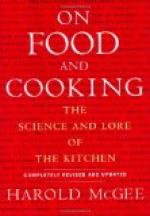The use of beverages in quantities with food at mealtime is prejudicial to digestion, because they delay the action of the gastric juice upon solid foods. The practice of washing down food by copious draughts of water, tea, or coffee is detrimental, not only because it introduces large quantities of fluid into the stomach, which must be absorbed before digestion can begin, but also because it offers temptation to careless and imperfect mastication, while tea and coffee also serve as a vehicle for an excessive use of sugar, thus becoming a potent cause of indigestion and dyspepsia. It is best to drink but sparingly, if at all, at mealtimes. Consideration should also be given to the nature of the beverage, since many in common use are far from wholesome. Very cold fluids, like iced water, iced tea, and iced milk, are harmful, because they cool the contents of the stomach to a degree at which digestion is checked. If drunk at all, they should be taken only in small sips and retained in the mouth until partly warmed.
Tea is often spoken of as the “cup that cheers but not inebriates.” “The cup that may cheer yet does injury” would be nearer the truth, for there is every evidence to prove that this common beverage is exceedingly harmful, and that the evils of its excessive use are second only to those of tobacco and alcohol. Tea contains two harmful substances, theine and tannin,—from three to six per cent of the former and more than one fourth its weight of the latter. Theine is a poison belonging to the same class of poisonous alkaloids, and is closely allied to cocaine. It is a much more powerful poison than alcohol, producing death in less than one hundredth part the deadly dose of alcohol; and when taken in any but the smallest doses, it produces all the symptoms of intoxication. Tannin is an astringent exercising a powerful effect in delaying salivary and stomach digestion, thus becoming one of the most common causes of digestive disorders. It is also a matter of frequent observation that sleeplessness, palpitation of the heart, and various disorders of the nervous system frequently follow the prolonged use of tea. Both theine and tannin are more abundant in green than in black tea.
The dependence of the habitual tea-drinker upon the beverage, and the sense of loss experienced when deprived of it, are among the strongest proofs of its evil effects, and should be warnings against its use. No such physical discomfort is experienced when deprived of any article of ordinary food. The use of tea makes one feel bright and fresh when really exhausted; but, like all other stimulants, it is by exciting vital action above the normal without supplying extra force to support the extra expenditure. The fact that a person feels tired is evidence that the system demands rest, that his body is worn and needs repair; but the relief experienced after a cup of tea is not recuperation. Instead, it indicates that his nerves are paralyzed so that they are insensible to fatigue.




